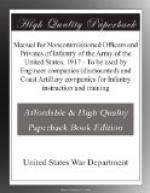183. An officer is entitled to the compliments prescribed, whether in uniform or not.
184. A sentinel in communication with an officer will not interrupt the conversation to salute. In the case of seniors the officer will salute, whereupon the sentinel will salute.
185. When the flag is being lowered at retreat, a sentinel on post and in view of the flag will face the flag, and, at the first note of the Star Spangled Banner or to the color will come to a present arms. At the sounding of the last note he will resume walking his post.
No. 12: To be especially watchful at night and during the time for challenging, to challenge all persons on or near my post, and to allow no one to pass without proper authority.
186. During challenging hours, it a sentinel sees any person or party on or near his post, he will advance rapidly along his post toward such person or party and when within about 30 yards will challenge sharply, “Halt, Who is there!” He will place himself in the best possible position to receive or, if necessary, to arrest the person or party.
187. In case a mounted party be challenged, the sentinel will call, “Halt, Dismount. Who is there?”
188. The sentinel will permit only one of any party to approach him for the purpose of giving the countersign (pars. 209 to 217), or, if no countersign be used, of being duly recognized. When this is done the whole party is advanced, i. e., allowed to pass.
189. In all cases the sentinel must satisfy himself beyond a reasonable doubt that the parties are what they represent themselves to be and have a right to pass. If he is not satisfied, he must cause them to stand and call the corporal of the guard. So, likewise, if he have no authority to pass persons with the countersign, or when the party has not the countersign, or gives all incorrect one.
190. A sentinel will not permit any person to approach so close as to prevent the proper use of his own weapon before recognizing the person or receiving the countersign.
191. When two or more persons approach in one party, the sentinel, on receiving an answer that indicates that some one in the party has the countersign, will say, “Advance one with the countersign,” and, if the countersign is given correctly, will then say, “Advance (so-and-so),” repeating the answer to his challenge. Thus it the answer be “Relief (friend with the countersign, patrol, etc.),” the sentinel will say, “Advance one with the countersign”; then “Advance, relief (friends, patrol, etc.).”
192. If a person having the countersign approach alone, he advanced to give the countersign. Thus if the answer be “Friend with the countersign (or officer of the day, or etc.).” the sentinel will say, “Advance, friend (or officer of the day, or etc.) with the countersign”; then “Advance, friend (or officer of the day, or etc.).”




